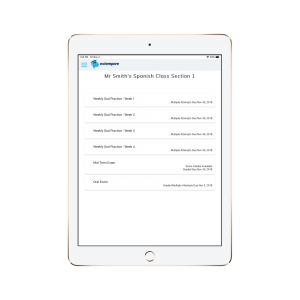With the cost of textbooks soaring over the past several years, there are many teachers and even more parents who are seeking alternatives to the traditional textbook in the classroom. Teachers don't want to ask students to pay $200-300 for a book anymore, and many students simply can't afford the cost. Luckily, as this truth takes hold more and more, the options for alternatives to textbooks has also grown.
In language classrooms, there are even more challenges with textbooks, such as a very low availability of contemporary books around less commonly taught languages, like Chinese and Russian. There are four different categories of skills that a language student will need to cover in the classroom, reading, writing, listening, and speaking. Below are textbook alternatives for each skillset.

Option 1: eTextbooks for Reading Skills
With the rise of devices like Kindle and Nook and the popularity of ebooks has also come an increase in the availability of online textbooks, or eTextbooks. Because these are digital copies instead of having to keep and maintain a traditional textbook, it's more possible to ensure that every student has the resources they require. The lack of the physical book also tends to mean that the price is typically able to be cut by more than half. eTextbook provider VitalSource allows purchasers to save up to 80% off the cost of the physical textbook.
Looking to change your classroom in other areas as well? Take a look at these alternatives to languages labs!
One downfall of eTextbooks is that without the maintenance issue of a physical book, there won't be any "new" or "used" categories of book meaning the price, although typically lower than physical textbooks, may remain more constant over time with less dramatic price drops. You also won't be able to sell your eTextbook back to get a little cash back.
Option 2: Online Resources for Listening Skills
There are many resources openly available to all on the internet that can be brought into the classroom. Teachers have used free resources such as videos from YouTube or Vimeo. These could be videos that are specifically used to teach the language of the classroom or even videos that are spoken in the language that is being learned with captions in the class' primary language.
There are also alternatives to textbooks through paid online courses available from sites like FluentU or Omniglot. A lot of times these paid resources will be highly interactive and include some form of gamification to motivate students. They may be available just on computers which may require a language lab, or they may be available as apps that could be downloaded to smartphones or tablets. Some of these apps may actually cover additional skills like reading and writing as well.

Option 3: Instructor-Created Resources for Writing Skills
Typically in the classroom, writing prompts come from things like worksheets and quizzes. Textbooks may also include sections and prompts that promote writing skills. However, some of the best resources for textbook alternatives are put together by teachers that dedicate some time to more creative approaches.
A couple of great ideas are things like language journals where you have the students tell you something simple about their day or their life in the language of the classroom within a journal every time they come to class. Another fun idea would be to have your students get real pen pals from the country where the language you are teaching originates. This would provide them with both reading and writing opportunities with native speakers of the language.
Option 4: Extempore App for Speaking Skills

Most teachers, and especially most language teachers, understand how difficult it is to get some students to speak in class or even face to face in their first language, much less in a language they are currently attempting to learn. WithExtempore, every student is able to get the app on their personal smartphone so there isn't a need for a language lab or tablets for the class.
There are many ways Extempore encourages students to speak the language, one of the primary ways is a student will receive either a written or audio prompt and will respond to it within the app, the response will be recorded and saved. The recording will allow for easy access for grading, but can also be extremely useful for students to self or peer assess as well. Students can access the recordings, play them back, and critique them. Students can even use the app to record a back and forth conversation between them.
Ready to try Extempore? Open an account today.


